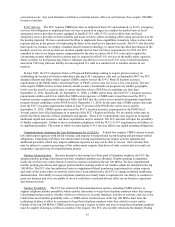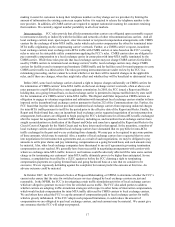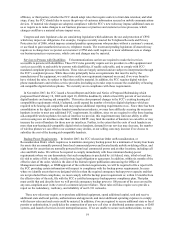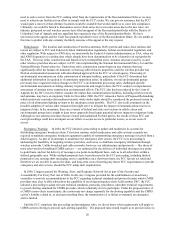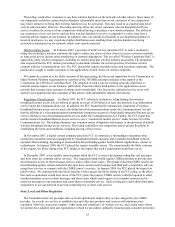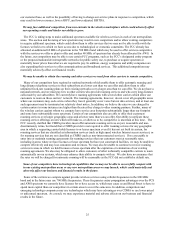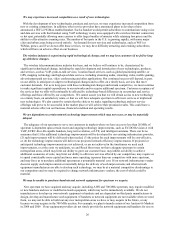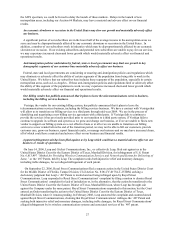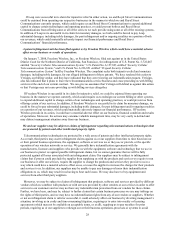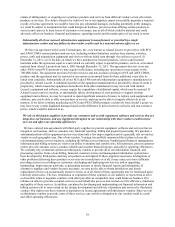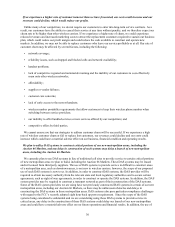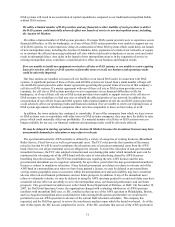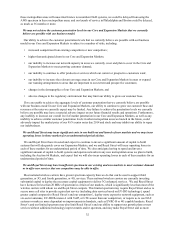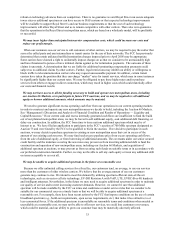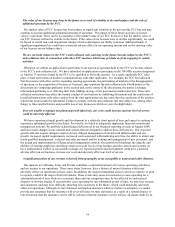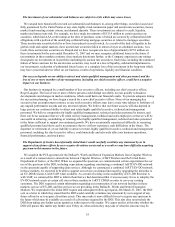Metro PCS 2007 Annual Report Download - page 36
Download and view the complete annual report
Please find page 36 of the 2007 Metro PCS annual report below. You can navigate through the pages in the report by either clicking on the pages listed below, or by using the keyword search tool below to find specific information within the annual report.25
our customer base, as well as the possibility of having to change our service plans in response to competition, which
may result in lower revenues, lower ARPU, and lower adjusted EBITDA.
We may face additional competition from new entrants in the wireless marketplace which could adversely affect
our operating results and hinder our ability to grow.
The FCC is taking steps to make additional spectrum available for wireless services in each of our metropolitan
areas. The auction and licensing of new spectrum may result in new competitors and/or allow existing competitors
to acquire additional spectrum, which could allow them to offer services that we may not be able to offer with the
licenses we hold or to which we have access due to technological or economic constraints. The FCC already has
allocated an additional 62 MHz of spectrum in the 700 MHz band which may be used to offer services competitive
with the services we offer or plan to offer and another 40 MHz of spectrum has already been allocated for AWS. In
the future, our competitors may be able to use certain FCC programs, such as the FCC’ s designated entity program
or the proposed nationwide interoperable networks for public safety use, to purchase or acquire spectrum at
materially lower prices than what we are required to pay. In addition, energy companies and utility companies are
also expanding their services to offer communications and broadband services. This additional competition may
materially adversely affect our financial results.
We may be unable to obtain the roaming and other services we need from other carriers to remain competitive.
Many of our competitors have regional or national networks which enable them to offer automatic roaming and
long distance telephone services to their subscribers at a lower cost than we can offer and allow them to offer
unlimited fixed-rate roaming plans on their existing networks over a larger area than we can offer. We do not have a
national network, and we must pay fees to other carriers who provide roaming services and who carry long distance
calls made by our subscribers. We currently have roaming agreements with several other carriers which allow our
customers to roam on those carriers’ network. The roaming agreements, however, do not cover all geographic areas
where our customers may seek service when they travel, generally cover voice but not data services, and at least one
such agreement may be terminated on relatively short notice. In addition, we believe the rates we are charged by
certain carriers in some instances are higher than the rates they charge to other roaming partners. Further, many of
the wireless carriers against whom we compete have service area footprints substantially larger than our footprint
and some have substantially more spectrum. Certain of our competitors also are able to offer their customers
roaming services over larger geographic areas and at lower rates than we can offer. Our ability to replicate these
roaming service offerings at rates which will make us, or allow us to be, competitive is uncertain at this time. The
FCC recently clarified that CMRS providers must offer automatic roaming services on just, reasonable and non-
discriminatory terms, but found that a CMRS provider is not required to offer roaming services for any geographic
area in which a requesting carrier holds licenses to or leases spectrum even if it has not yet built its system, for
roaming services that are classified as information services (such as high speed wireless Internet access services), or
for roaming services that are not classified as CMRS (such as non-interconnected services). If we are unable to
enter into or maintain roaming agreements for roaming services that our customers want at reasonable rates,
including in areas where we have licenses or lease spectrum but have not constructed facilities, we may be unable to
compete effectively and may lose customers and revenues. We may also be unable to continue to receive roaming
services in areas in which we hold licenses or lease spectrum after the expiration or termination of our existing
roaming agreements. We also may be obligated to allow customers of other technically compatible carriers to roam
automatically on our systems, which may enhance their ability to compete with us. We also have no assurance that
the rates we will be charged for automatic roaming will be reasonable as the FCC did not establish a default rate.
Some of our competitors have technological capabilities that we may not be able to successfully compete with
in our existing metropolitan areas or any new metropolitan areas we may launch, which could materially and
adversely affect our business and financial results in the future.
Some of the carriers we compete against provide wireless services using cellular frequencies in the 800 MHz
band and in the future may use 700 MHz frequencies. These frequencies enjoy propagation advantages over the PCS
and AWS spectrum we currently have licenses for or have access to, which may cause us and Royal Street to have to
spend more capital than our competitors in certain areas to cover the same area. In addition, competitors and
emerging technology companies may use technologies which may have advantages over CDMA or use lower priced
or unlicensed spectrum. As a result, we may experience material and adverse effects on our business and financial
results in the future.



